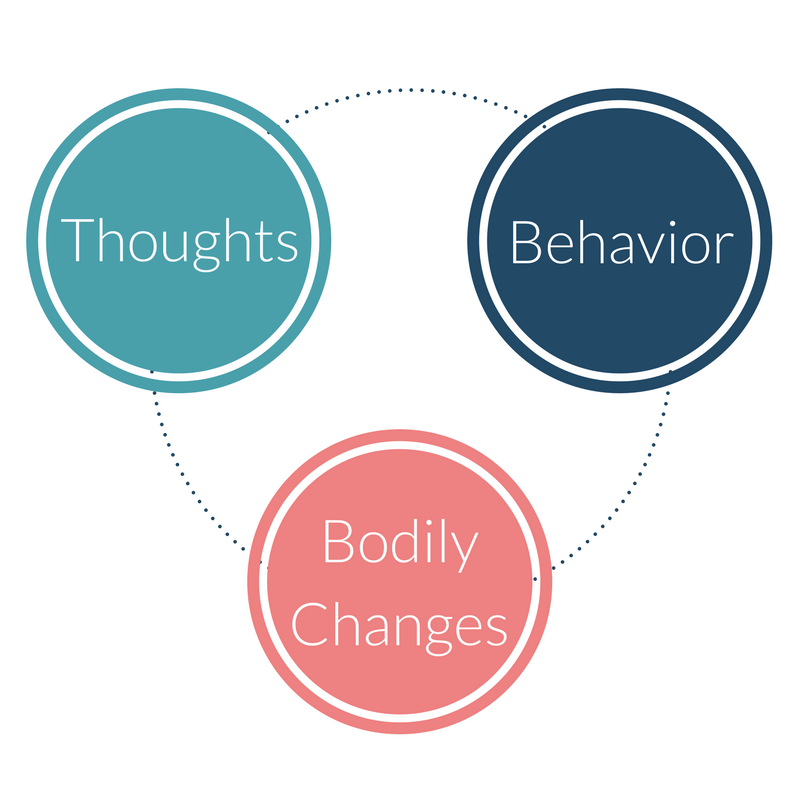Here’s What One Ivy-League Professor’s Counter-Intuitive Theory Can Teach You About Anxiety

When we think about anxiety, it’s usually the uncomfortable feelings and the negative thoughts that come to mind. But there’s a third aspect to it which is just as important — our behavior. Our actions play a crucial role in keeping anxiety alive. But they can also be a way out of it. Here’s how.
How Anxiety Works
Our thoughts, feelings and behaviors don’t exist in a vacuum. They influence each other and they all contribute to anxiety in their own way.

Let’s say you worry about being a bad, somehow defective person. A thought like ‘What if none of my friends really likes me?’ comes up. As a result, your chest tightens a bit and you start to feel your heart beating faster. To take off this unpleasant feeling and calm you down, you grab your phone and check if you got any new messages. Or you might turn on the tv in order to distract yourself.
In this post, I want to focus on this final aspect — the actions you take in response to feeling anxious and thinking negative thoughts.
How Certain Behaviors Perpetuate Anxiety
So what actions are those? The most common kind is to avoid things that cause anxiety. That makes sense — why wouldn’t we avoid things that make us feel bad?! And in the short term, this does work. Just think about the sense of relief you get when you postpone that one important but uncomfortable conversation for another day. Or when you find an excuse not to go to that party where you don’t know anyone else. The feeling of anxiety is gone and it’s replaced by this sweet feeling of relief. Your problem is temporarily out of the way.
But that’s exactly the problem. In the long run, this strategy doesn’t work. If we always avoid anxiety-provoking situations, we never learn how to deal properly with them. We never learn that those thoughts and feelings aren’t that bad after all. And we never get to truly understand that we can act even though we don’t feel good. And that’s how our avoidance helps keep our anxiety alive.
Introducing… Self-Perception Theory
For this, let’s take a step back and consider something fundamental about the way we think of ourselves. Usually, it goes like this: We act a certain way because that’s how we are. We approach other people openly because we are extroverted. We say the truth because we care about being honest. We avoid certain things because we are anxious.
And of course, that’s true. But it’s only half the story.
That’s where the researcher and psychologist Daryl Bem came in. In a series of experiments, he was able to show that the opposite is true as well. After an evening of good conversations with other people, we consider ourselves more extroverted. After having told a truth instead of a lie, we care more about being honest than before. And after avoiding a situation that would have made us uncomfortable, we infer that we must be too anxious to handle situations like this.
He called this insight self-perception theory. It says that the human brain forms opinions about ourselves the same way it forms opinions about other people: By observing behavior. It’s counterintuitive, yes. But it illustrates a simple yet powerful fact about human nature: We are constantly watching ourselves and that’s how we become what we do.
This is even at work at the darkest places of the human mind: Research shows that terrorist groups often exploit this in their recruitment efforts: Cunning recruiters ask sympathizers to take small yet increasingly radical actions. If those potential members comply, their attitudes change gradually, too. And they end up becoming more and more radical so that some of them eventually join.
So What’s The Solution?
Yet how can we use this insight for our own benefit? By turning our usual approach on its head. We don’t need to get rid of uncomfortable feelings or negative thoughts first. We can start by changing our behavior.
Someone with social anxiety could go to a party even though they might not feel like they are going to enjoy it. Someone who’s afraid of getting rejected could still apply for jobs even though they are pessimistic about their chances. And a shy person could still approach other people even though that makes them scared.
In other words, it’s fake it till you make it. If you act like the person you want to be, you’ll eventually think of yourself as this kind of person.
If you want to learn more techniques to manage anxiety, try Stresscoach. It’s a chat bot that guides you through a program to manage anxiety — step by step and one day at a time:
